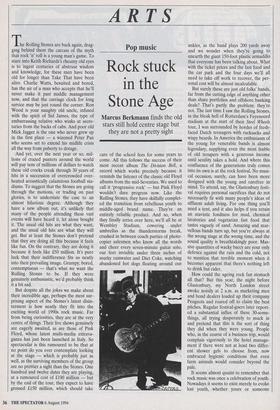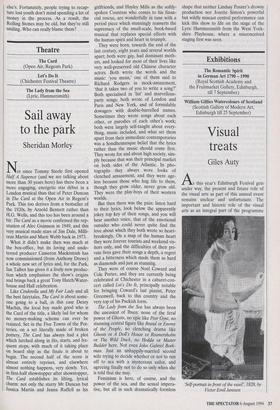ARTS
Pop music
Rock stuck in the Stone Age
Marcus Berkmann finds the old stars still hold centre stage but they are not a pretty sight
The Rolling Stones are back again, drag- ging behind them the carcass of the myth that rock 'n' roll is a young man's game. To stare into Keith Richards's rheumy old eyes is to ingest centuries of abstruse wisdom and knowledge, for these men have been old for longer than Take That have been alive. Charlie Watts, besuited and bored, has the air of a man who accepts that he'll never make it past middle management now, and that the carriage clock for long service may be just round the corner. Ron Wood is your naughty old uncle, infused with the spirit of Sid James, the type of embarrassing relative who winks at secre- taries from the backs of cabs. And poor old Mick Jagger is the one who never grew up in the first place — a wizened Peter Pan who seems set to extend his midlife crisis all the way from puberty to dotage.
And yet, over the next year or so, mil- lions of crazed punters around the world will pay tens of millions of dollars to watch these old crocks creak through 30 years of hits in a succession of overcrowded over- heated acoustically calamitous football sta- diums. To suggest that the Stones are going through the motions, or trading on past glories, is to understate the case to an almost hilarious degree. Although they have a new album out, it's unlikely that many of the people attending these vast events will have heard it, let alone bought it. The usual old hits are what they want, and the usual old hits are what they will get. But at least the Stones don't pretend that they are doing all this because it feels like fun. On the contrary, they are doing it because it feels like £50 million. It's pure luck that their indifference fits so neatly into their prevailing image. Grumpy, bored, contemptuous — that's what we want the Rolling Stones to be. If they were genuinely enthusiastic, we'd probably think it a bit sad.
But despite all the jokes we make about their incredible age, perhaps the most sur- prising aspect of the Stones's latest disin- terment is how neatly they fit into the exciting world of 1990s rock music. Far from being curiosities, they are at the very centre of things. Their live shows genuinely are eagerly awaited, as are those of Pink Floyd, whose latest multi-media extrava- ganza has just been launched in Italy. So spectacular is this rumoured to be that at no point do you ever contemplate looking at the stage — which is probably just as well, as the surviving members of the group are no prettier a sight than the Stones. One hundred and twelve dates they are playing, at a rumoured cost of £100 million — but by the end of the tour, they expect to have grossed £150 million, which should take care of the school fees for some years to come. All this follows the success of their most recent album The Division Bell, a record which works precisely because it reminds the listener of the classic old Floyd albums from the mid-Seventies. We used to call it 'progressive rock' — but Pink Floyd wouldn't dare progress now. Like the Rolling Stones, they have skilfully complet- ed the transition from rebellious youth to middle-aged brand name. They're an entirely reliable product. And so, when they finally arrive over here, we'll all be at Wembley Stadium, cowering under umbrellas as the thunderstorms break, crushed in between coach parties of photo- copier salesmen who know all the words and cheer every seven-minute guitar solo, our feet invisible under three inches of murky rainwater and Diet Coke, watching abandoned hot dogs floating around our ankles, as the band plays 200 yards away and we wonder when they're going to unearth the giant 150-foot plastic armadillo that everyone has been talking about. What with the ticket prices and the fast food and the car park and the four days we'll all need to take off work to recover, the per- sonal cost will be almost incalculable.
But surely these are just old folks' bands, far from the cutting edge of anything other than share portfolios and offshore banking deals? That's partly the problem: they're not. The last time I saw the Rolling Stones, in the bleak hell of Rotterdam's Feyenoord stadium at the start of their Steel Wheels tour, I was surrounded by hordes of fresh- faced Dutch teenagers with rucksacks and wispy beards. In America the enthusiasm of the young for venerable bands is almost legendary, supplying even the most feeble of old troupers with a generous income until senility takes a hold. And where this confluence of the generations truly comes into its own is at the rock festival. No musi- cal occasion, surely, can have been more designed with the young and carefree in mind. To attend, say, the Glastonbury festi- val requires personal sacrifices that do not necessarily fit with many people's ideas of affluent adult living. For one thing you'll need a tent, and it also helps if you retain an atavistic fondness for mud, chemical lavatories and vegetarian fast food that tastes vaguely of sand. Amazing and mar- vellous bands turn up, but you're always at the wrong stage at the wrong time, and the sound quality is breathtakingly poor. Mas- sive quantities of wacky baccy are your only defence against the rain and the cold, not to mention that terrible moment when it becomes apparent that there's nothing left to drink but cider.
How could the ageing rock fan stomach all that? But this year, the night before Glastonbury, my North London street awoke noisily at 2 a.m. as marketing men and bond dealers loaded up their company Peugeots and roared off to claim the best pitches. Regular festival-goers later report- ed a substantial influx of these 30-some- things, all trying desperately to muck in and pretend that this is the sort of thing they did when they were young. People who, in the course of a business trip, would complain vigorously to the hotel manage- ment if there were not at least two differ- ent shower gels to choose from, now embraced hygienic conditions that even farm animals would consider beyond the pale.
It seems almost quaint to remember that rock music was once a celebration of youth. Nowadays it seems to exist merely to evoke lost youth, whether yours or someone else's. Fortunately, people trying to recap- ture lost youth don't mind spending a lot of money in the process. As a result, the Rolling Stones may be old, but they're still smiling. Who can really blame them?



















































 Previous page
Previous page